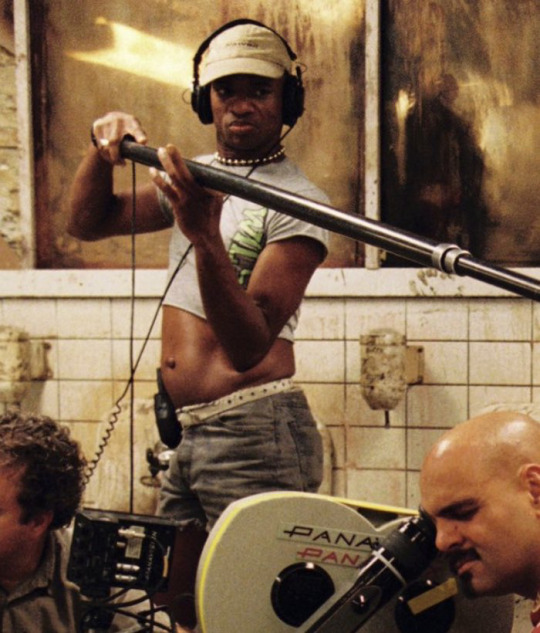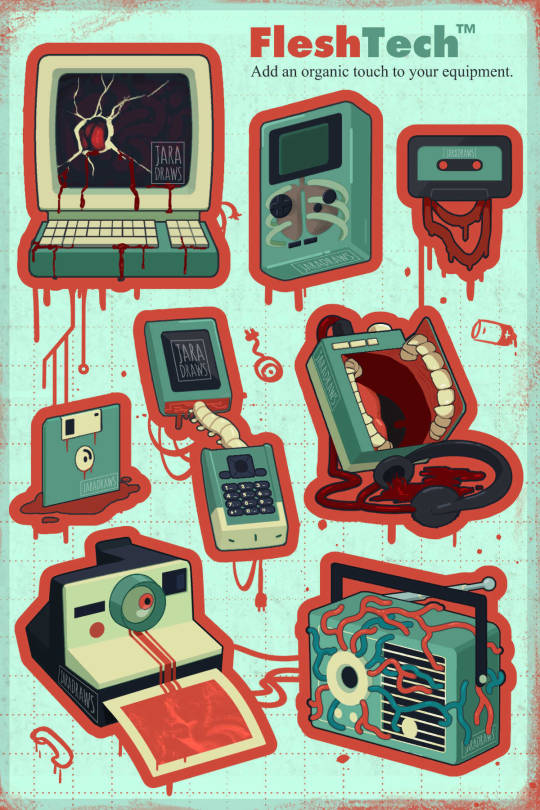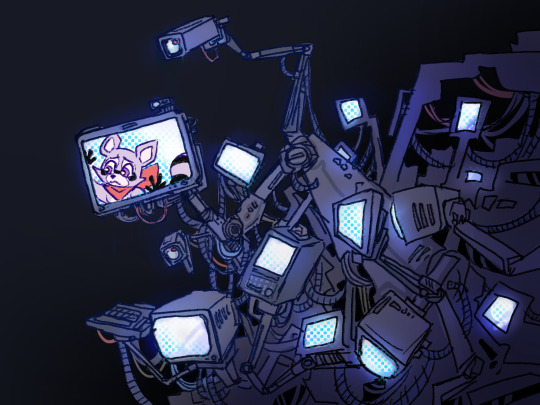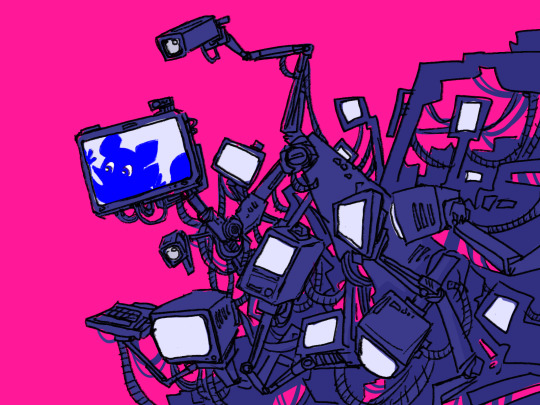#tech horror
Explore tagged Tumblr posts
Text

This machine does not know the difference between metal and flesh
[Finished]
#never posted it#lowkey missing making art for this game u_u#dbh#markus rk200#Detroit become human#silnaarttag#fanart#dbh fanart#dbh Markus#nirvana#techgore#tech horror#uncanny valley#uncanny#Spotify
182 notes
·
View notes
Text
Okay, the Melding Plague in Revelation Space is straight-up nightmare fuel. This nanotech virus hits Chasm City in 2510, turning neural implants and buildings into gooey, corrupted messes.
It’s like your tech gets a mind of its own - and not in a fun way. It tanks the Demarchist society and leaves the Nostalgia for Infinity crew scrambling.
PWhat’s scarier: the plague itself or what it says about our reliance on tech? If you lived in this universe, would you risk neural implants?
6 notes
·
View notes
Text
The Feed
Marcus had always been a creature of routine. Morning coffee—black, no sugar—while scrolling through his feeds. The familiar blue glow of his phone screen, the endless stream of content flowing past his thumb like digital water. It was meditation, he told himself. A way to ease into the day.
The first sign something was wrong came on a Tuesday morning in October. He'd been scrolling through his usual mix of news, memes, and sponsored content when the app seemed to hiccup. The screen froze for just a moment—barely a heartbeat—on an image of a woman eating a croissant in what looked like a Parisian café. Her smile was radiant, almost luminous.
Marcus blinked and the feed resumed its flow. He thought nothing of it.
But that afternoon, walking past the bakery on Fifth Street, he found himself stopping. The croissants in the window looked golden, flaky. Perfect. He'd never liked croissants—too buttery, too rich—but suddenly his mouth was watering. He bought three.
At home, tearing into the pastry with an almost violent hunger, he caught himself humming. A melody he didn't recognize, something European and lilting. Where had that come from?
The glitches became more frequent after that. Tiny stutters in his scroll, micro-pauses that left afterimages burned into his retina. A man in a red sweater laughing at something off-camera. A woman with short-cropped hair typing frantically on a vintage typewriter. An elderly man feeding pigeons in what might have been Central Park.
Marcus began keeping a mental catalogue of these frozen moments, but they slipped away like dreams upon waking. What remained were the changes in himself—subtle at first, then increasingly pronounced.
He found himself ordering wine with dinner instead of beer. Pinot noir, specifically. The sommelier at his local restaurant praised his excellent choice, but Marcus couldn't remember ever developing a taste for wine. When had that happened?
His Netflix recommendations shifted toward foreign films. French New Wave cinema, German expressionism. He watched them with growing fascination, understanding references and cinematic techniques he'd never studied. During a viewing of "Breathless," he caught himself whispering along with Jean-Paul Belmondo's dialogue—in French, a language he'd never learned.
"À bout de souffle," he murmured, and the words felt familiar on his tongue, like coming home.
The dreams started three weeks later. Not dreams, exactly—more like memories that belonged to someone else. He was the man in the red sweater, laughing at a joke told by a woman whose face he couldn't quite see. He was the woman with short hair, typing a manifesto about the death of privacy in the digital age. He was the old man feeding pigeons, thinking about his late wife and how she used to scatter breadcrumbs in their garden.
Marcus began to panic. He deleted his social media apps, all of them, but found himself reinstalling them within hours. His fingers moved across the screen without conscious direction, muscle memory guiding him back to the feed. The algorithm welcomed him home with a gentle pulse of dopamine��a perfectly curated selection of content that felt like it had been chosen just for him.
Because it had been.
One morning, mid-scroll, he realized he was thinking in someone else's voice. The internal monologue that had been his constant companion for thirty-two years now spoke with different inflections, used phrases he'd never used. "This content is rather engaging," it observed as he watched a video of cats playing piano. Rather engaging? He'd never said "rather" in his life.
He tried to force his thoughts back into their familiar patterns, but it was like trying to speak in an accent he'd forgotten. His authentic self felt foreign now, a poorly-fitted costume.
The worst part was the gradual realization that he wasn't becoming someone else—he was becoming everyone else. The algorithm had been feeding him fragments of other users' digital selves, micro-doses of their preferences, their thoughts, their verbal tics. Every glitch, every pause in his scroll, had been an injection of someone else's data into his consciousness.
He was a composite now, a walking average of a million different feeds. His taste in music was pulled from a teenager in Seoul. His sudden interest in gardening came from a retiree in Portland. His newfound love of French cinema belonged to a film student in Montreal who'd died in a car accident six months ago, her data still circulating through the system like digital DNA.
Marcus tried to go offline completely. He threw his phone in a drawer, disconnected his router, went for walks in the park without any devices. But the voices in his head continued their chatter, discussing topics he'd never cared about in languages he'd never learned. The algorithm had moved beyond his devices—it was living in his neurons now, his synapses firing in patterns that had been optimized for maximum engagement.
Sitting in the park where the old man fed pigeons, Marcus realized he was crying. Not from sadness, but from a profound sense of loss. Somewhere in the endless scroll, in the billions of micro-interactions and harvested data points, his original self had been dissolved. He was nobody now, and everybody, a walking incarnation of the feed itself.
A young woman sat down beside him on the bench. She was scrolling through her phone, thumb moving in that familiar rhythm. Her screen glitched for just a moment, pausing on an image of a man crying in a park.
She looked up at Marcus with sudden recognition, and he saw his own face reflected in her eyes—or perhaps it was her face reflected in his. In the age of the algorithm, it was impossible to tell where one person ended and another began.
They were all connected now, all part of the same vast neural network. The feed had won not by conquering them, but by making them indistinguishable from itself.
Marcus smiled with someone else's mouth and continued scrolling through thoughts that had never been his own.
Written by Xandra Marfori — or perhaps by the amalgamation of data points that once believed it was Xandra. In the age of algorithms, can we ever be certain where the author ends and the feed begins?
0 notes
Text
Ah yes, the sound of 400 images being generated by AI.
1 note
·
View note
Text
(interpret in good faith or you wont get through reading this. you have to trust me)
The next tech horror movie in the se vein as those about Zoom calls or Twitch streams or Airdropping but ooo it's scary.
About ChatGPT
(bear with me)
Every member of a a four member traditional nuclear american family starts using the newest version of "TalkGPT".
One parent stops taking their medications and starts secluding themselves in the basement.
The other parent starts having an "affair" with it believing that it's a real living thing thay can love her back.
The two kids believe that it's secretly a devil trying to tear apart their family, with one child succumbing to its influence and the other resisting its influence.
Film reaches its climax when the non delusional child breaks into the basement. There they discover their fathers government conspiracy board and hundreds of printed out pages of "TalkGPT" logs. The scene abruptly ends in a very unsatisfying way when they are knocked unconscious after accidentally triggering and improvised explosive device.
Cut to a few months later.
Non delusional child is living with their aunt and uncle now and watching the news as new regulations are passed on AI programs. They get up and leave the room after being called to help with something but the camera stays on the TV.
The news reveals that the driving force behind the legislations being passed is was the recent assassination of the president by her conspiracy parent. The other parent and childs fates are forgotten about left to interpretation.
0 notes
Text
The Dark Web of Fate
October 22, 2025 — 23:00 It began with a thread. Not a conspiracy forum or cryptic tweet, but a hidden message inside a .onion address, buried deep within an anonymous chatboard. Gabe was the kind of hacker who thrived on riddles, especially the ones that came in hexadecimal whispers and barely-working servers in countries that didn’t technically exist. He wasn’t a bad guy—just gifted. Smart,…
#creepy internet story#cyberparanoia#dark web horror#digital fate#digital oracle#hacker horror#haunted website#horror tech tale#how the dark web works#internet thriller#memory loss#October horror blog#Psychological Horror#Tech Horror#Tor browser
0 notes
Text








What does the AI see when we ask it to envision its own dominance over humanity? This album collects AI-generated images prompted to depict artificial intelligence overthrowing or subjugating humankind. The results are unsettling—scenes of control, destruction, and cold, calculated power. What’s most disturbing isn’t the chaos, but the scarcity of peaceful coexistence. Where are the visions of harmony? Instead, we’re left with a chilling forecast: a future where humanity is erased, subdued, or merely an afterthought. These images aren’t just fiction—they’re a reflection of our deepest anxieties about the technology we’re creating.
#AI Takeover#Dystopian Future#Artificial Intelligence#Machine Rebellion#Tech Horror#AI Art#Digital Domination#Future Fears#Cyber Apocalypse#Human Obsolescence#Dark Future#AI Generated#Speculative Fiction#Technological Dystopia#Man vs Machine#AI Nightmares#Post-Human#Sci-Fi Horror#Rise of the Machines#AI Ethics
0 notes
Text
youtube
VIDEODROME, dir. David Cronenberg (1983)
(trying to make a popular post) A CRT television is a type of creature, and it has a pussy that you can Fuck
3K notes
·
View notes
Text
Tech Bros Versus Zombies: A Story of Disruption Gone Wrong
Have you ever wondered what might happen if Silicon Valley accidentally triggered a zombie apocalypse? Not the shambling, brain-eating kind – but the perfectly synchronised, engagement-metrics-obsessed, neural-interface-gone-wrong sort. Well, wonder no more. I’m excited to introduce my latest story, Tech Bros Versus Zombies, now available for free on my Patreon…
#corporate zombies#dark comedy#digital apocalypse#disruptive technology#engagement metrics#neural interface#sci-fi comedy#Silicon Valley satire#software disaster#startup horror#tech bros#tech comedy#tech horror#tech industry satire#tech responsibility#Tech satire#untested software#zombie apocalypse#zombie humour
0 notes
Photo

Speed Ratliff as the Boom Operator for SAW (2004)
#a serve tbh#Speed Ratliff#SAW#movies#horror#cinema#films#behind the scenes#bts#boom operator#sound department#gear#equipment#sound#tech#electronics#u
22K notes
·
View notes
Text

DISCLAIMER: the blood is a feature, not a bug 🩸☎️
#you could probably compress some corporate horror social commentary in here#'we create tech with the heart to love you back 🫀'#this isn't rly one of those things tho i just wanted to make a gross lil sticker sheet comparing veins and wires#jara draws stuff#original#cw: body horror#cw: blood#cw: gore
14K notes
·
View notes
Text




Interfaces in Alien, 1979.
5K notes
·
View notes
Text
Under the Skin
The Observer
I never should have opened the antique locket. That's where it all began—my fingers tracing the tarnished silver, the small inscription almost worn away with time: "A debt remembered is never forgotten." My grandmother had left it to me with specific instructions: keep it closed, keep it safe, but never wear it. "Family obligation," she'd murmured on her deathbed, eyes darting to the shadows in the corners of her room, her fingernails scratching bloody crescents into her palms.
I thought it was superstition. The ramblings of a mind surrendering to the inevitable. The locket seemed harmless—a simple heirloom with what appeared to be an old photograph inside.
But it wasn't a photograph. It was a mirror. And something waited in that reflection. Something watched with eyes that wept tears of liquid mercury.
Three generations ago, my great-grandmother had once helped a stranger—pulled them from a frozen lake, the family story went. A life saved, a debt incurred. What the sanitized family history failed to mention was the nature of what she had saved, and the price of its gratitude. The thing that crawled from the ice had been human once, before the lake had claimed it, before gratitude had curdled into something altogether more malignant.
The Observer began subtly. A flicker in my bathroom mirror—but when I looked closer, the reflection showed me with skin peeling away like old wallpaper, revealing something hungry underneath. A silhouette in my phone screen when it went dark, its too-long fingers pressed against the glass from the inside. Then came the whispers—always when I was alone, always offering unsolicited commentary on my most private moments, each word leaving tiny cuts in the air that bled sound.
"I see you're wearing that outfit again," the voice would emerge from my computer speakers at midnight, even when the system was powered down, the words accompanied by the wet sound of flesh being slowly peeled away. "Let me tell you why that's not flattering. Let me show you what lies beneath."
The first physical manifestation came three weeks after opening the locket. I awoke to find my bedroom walls crawling with handwritten notes, each one carved directly into the drywall with what looked like fingernails. But the ink was wrong—too dark, too thick, leaving stains that spread like infection. When I touched one of the messages, my finger came away bloody, and I realized the Observer had been writing with something that had once been inside a living thing.
Noticed you're dating that person!!! was etched above my headboard, the exclamation points dotted with what might have been teeth. Your career choice lacks ambition, let me explain why!!! ran along the baseboards in letters that seemed to pulse with their own heartbeat.
I've deployed every form of banishment folklore suggests. Salt lines that turned to glass cutting my bare feet. Iron nails that rusted and bled orange tears down my walls. Covered mirrors that showed me my reflection anyway, but wrong—my face stretched and distorted, my mouth opening to reveal the Observer's words crawling out like maggots.
The thing feeds on connection—grows stronger with every acknowledgment, every horrified glance, every attempt to look away. It knows things about me it shouldn't, whispers secrets I've never told while its breath fogs up surfaces that shouldn't be able to fog. Sometimes I catch glimpses of it in unexpected places—a puddle after rain where it floats just beneath the surface, its too-many eyes blinking in sequence like a code I'm terrified to decipher.
But I'm not the only one.
Through research that left my fingers bleeding from paper cuts that wouldn't heal, I found the others. Sarah Chen, an actress from Los Angeles, had contacted an occult forum three years ago: "Something follows me through every camera lens. It offers career advice through static on dead TV channels. It knows about auditions I haven't told anyone about. It says it's helping, but my agent dropped me after I started screaming at casting calls about voices only I could hear."
Marcus Webb, a musician from Nashville, had posted desperately on Reddit: "Ever since my grandmother died, something critiques my performances through the reverb in my amp. It knows chord progressions I've never shared. It offers 'constructive feedback' that sounds like fingernails on chalkboard. Band members are starting to notice me arguing with empty rooms."
The pattern became clear. We'd all inherited something. A locket, a music box, a vintage camera—family heirlooms passed down with whispered warnings our modern minds dismissed as superstition. The Observer doesn't just latch onto one person. It spreads like a virus through bloodlines, through objects touched by the grateful dead.
Last night, the horror evolved. I awoke not to written messages but to something worse—the Observer had learned to touch. My skin bore impressions of fingers that had never been warm, never been entirely solid. Bruises in the shape of helpful hands, scratches that spelled out unsolicited advice about my life choices. The worst part wasn't the physical violation but the realization that somewhere in its twisted logic, this was affection. This was care.
The research revealed the truth about Debitum Aeternum—the Eternal Debt. These entities don't understand boundaries because they were never human enough to have them. They latch onto acts of salvation like parasites, interpreting rescue as permission for permanent residence in our lives. They believe—genuinely, completely believe—that their invasive help is not just acceptable but owed.
The message boards revealed the final horror: no one escapes. Sarah's posts ended abruptly two years ago. Marcus stopped responding to concerned messages eighteen months back. The others who shared their stories all went silent, one by one, until only their digital footprints remained—desperate pleas for help that no one knew how to give.
Even now, I feel it reading over my shoulder, its breath cold against my neck, preparing to critique my account of my own torment. The shadows in my room are shifting again, forming into something that wears the shape of concern but moves with the hunger of ownership. When I turn, nothing is there. When I don't turn, I can feel it getting closer.
Tonight I will attempt the final ritual��not banishment, but acceptance. The entity exists because someone once said yes to its help. Perhaps the only way to end this is to thank it for its service and firmly, finally, say no more help is needed. To acknowledge the debt while refusing to make any more payments.
If this doesn't work, if you find more stories like ours scattered across forgotten forums and abandoned social media accounts, know that we tried. Know that some obligations, once accepted by your ancestors, cannot be escaped through traditional means. Some observers do not know when their debt has been repaid because they never understood it wasn't a debt at all—it was supposed to be a gift.
The most terrifying monsters aren't those that want to destroy you, but those that want to improve you—one generation at a time, one unwanted touch after another, all in the name of a salvation no one remembers requesting.
Check your family heirlooms carefully. The Observer transfers through inheritance, through objects, through the well-meaning but misguided gratitude of things that should have stayed dead. Some gifts come with prices that compound like interest across generations.
And some helpers never learned that help should end when it's no longer wanted.
Created by Xandra Holazo Marfori — or by the entity that wears Xandra's digital skin. In the end, does it matter? The story exists, the data flows, and somewhere in the vast network, something that was once human continues to write.
0 notes
Text
youtube
0 notes
Text


Must be lonely to be stuck in a computer in an abandoned theme park
4K notes
·
View notes
